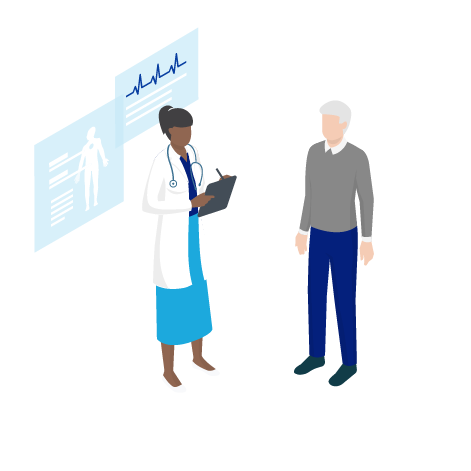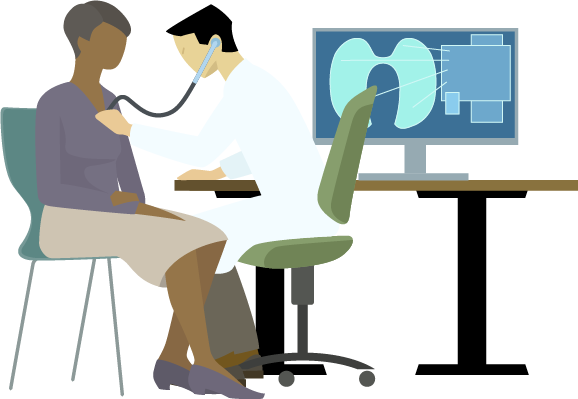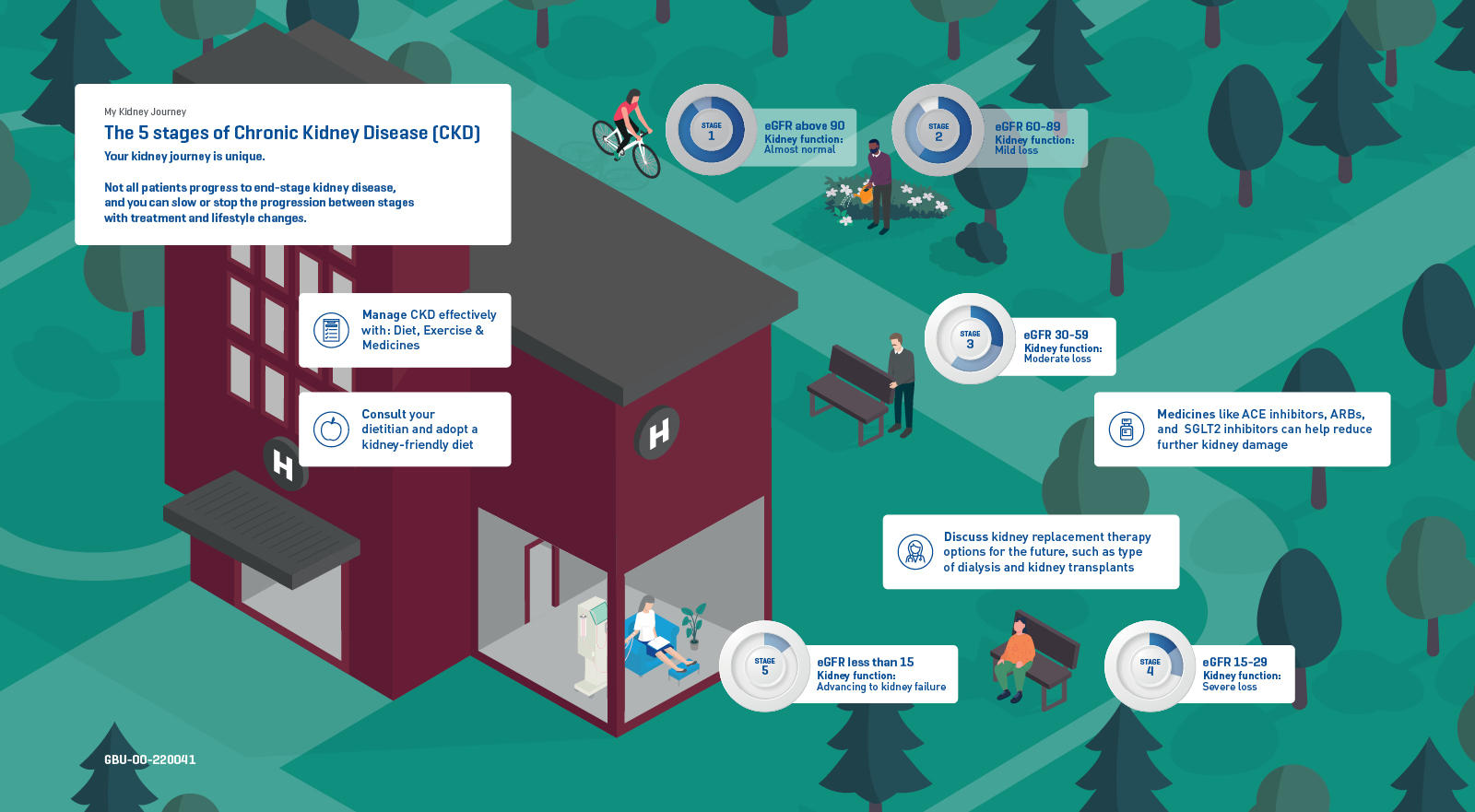Chronic Kidney Disease: Stage 4
Chronic kidney disease (CKD) is a condition in which kidney function declines gradually over time and can possibly lead to kidney failure in some patients. As CKD progresses, the kidneys are unable to filter toxins and excess fluid from the body, leading to the onset of symptoms and the risk of developing other health problems. The term “chronic” does not refer to the severity of the disease but refers to the fact that it is a long-term condition which progresses over years. Treatment for CKD involves slowing its progression and managing related complications.
The 5 stages of chronic kidney disease
Chronic kidney disease (CKD) is divided into 5 stages based on kidney function, and whether there are signs of blood or protein in the urine.
During stage 1, your kidneys are working at an almost normal level, but there may be blood or protein in the urine. There are no symptoms of CKD itself, but there may be symptoms of the underlying diseases causing the CKD, such as diabetes or a glomerulonephritis.
As CKD progresses to stage 2, the loss of kidney function is still mild, and symptoms have not developed. However, people with for example diabetes are often diagnosed during CKD stage 2 and will start on treatment to help reduce the risk of CKD worsening.
CKD stage 3 is a key stage when symptoms may first occur, or kidney disease may be first diagnosed. At this stage, treatment should be undertaken to slow the progression of the disease. Many people live with stage 3 CKD, with only some progressing to the advanced stages. Regardless, undergoing regular assessment and treatment is important to prevent the progression.
CKD stage 4 means there is advanced kidney damage, with a high risk of progression to kidney failure and there need to be discussions and planning for replacing kidney function with dialysis. On the other hand, stage 5 indicates kidney failure, also called end-stage renal disease or end-stage kidney disease, where replacing kidney function will need to start.
An overview of stage 4 kidney disease
At CKD stage 4, your kidneys are severely damaged and there is substantial decline in kidney function, leading to toxin and fluid buildup in your body. A blood test to determine kidney function at this stage would give an estimated glomerular filtration rate (eGFR) of 15-29 ml/min. It is likely that you would be experiencing symptoms from CKD, as well as other health issues such as anemia caused by CKD. This is a critical phase for understanding the need for replacing kidney function and what your options may be.
Symptoms of stage 4 kidney disease
The signs of kidney disease generally start appearing at stage 3, but sometimes they do not appear until stage 4. During stage 4, symptoms are more common and may worsen whilst kidney function declines further.
The symptoms of CKD stage 4 may include:
- Fatigue
- Shortness of breath
- Swelling in your hands and feet
- Puffy eyes
- Change in urine color or amount
- Muscle cramps
- Poor appetite
- Nausea and bad taste in the mouth
- Trouble sleeping
- Itch
- Discoloration of nails and skin
Symptoms may vary between people. It’s important to be aware of all the symptoms of CKD so you can discuss with your doctors if you find yourself experiencing any.

Treatment for stage 4 kidney disease
Treatment for CKD stage 4 is focused on treating health issues caused by impaired kidney function, slowing down the progression of CKD, and exploring the need for kidney replacement therapy. During this stage, your regular doctor should refer you to a kidney specialist, a nephrologist, if you are not already under their care to oversee your care in the long run. Based on assessment of your overall condition, your nephrologist will start discussing with you, and planning for potential kidney replacement therapy (dialysis and transplantation) when end-stage kidney disease occurs.
Managing stage 4 kidney disease
Managing your kidney disease to slow down its progression is critical at CKD stage 4, as in stage 3. In addition, there will be a focus on the health issues caused by the CKD such as anemia and metabolic bone disease. At this stage, it is also important to focus on maintaining fluid balance to avoid fluid building up in your legs or lungs.
Other recommendations include making changes to your diet, moderate exercising, stopping smoking, limiting, or avoiding alcohol consumption, maintaining a healthy weight, and monitoring other health issues, such as blood pressure or diabetes.
Diet
Diet is an important part of managing your kidney disease as kidneys are responsible for filtering out toxins and salts (such as potassium). A dietitian is a key member of your healthcare team who will be overseeing your care. For CKD stage 4, you will get specific dietary recommendations around your consumption of protein, phosphorus, and potassium, along with reduced sodium intake. You will also receive specific advice about your fluid intake.
Exercising
Exercise is key to remaining healthy and it is no different once being diagnosed with CKD. Regular exercise can also help manage other conditions, such as blood pressure and diabetes. At CKD stage 4, you should be able to exercise moderately. Discuss your exercise routine with your healthcare team and follow recommendations.
Regular monitoring
Regular monitoring and follow ups with your healthcare team is vital at CKD stage 4. Your nephrologist will want to see you at regular intervals to assess the progression of your kidney disease and help manage your symptoms and health issues caused by CKD. You will also have to continue to consult your primary care doctor and any other specialists for specific health conditions.

Outlook for stage 4 kidney disease
At CKD stage 4, your kidneys are severely damaged and overall kidney function has substantially declined. However, it is still possible to slow down the progression of CKD and manage other potential health issues by following your healthcare team’s recommendations.
It is important to know that depending on your overall condition and the decline in kidney function, your healthcare team will start talking about kidney replacement therapy options for end-stage renal disease or kidney failure.
Talking about kidney replacement therapy
Your nephrologist and other members of the multidisciplinary healthcare team will start assessing your overall condition and giving you information about kidney replacement therapy. They will discuss the available options and want to hear your view about how they would fit with your lifestyle and your preferences. You should get a full understanding of the options, seeing the different options and spend time thinking carefully how they would work best for you. At the end of that process, you and your nephrologist, will make a decision about the treatment option together that is the best fit for you.
